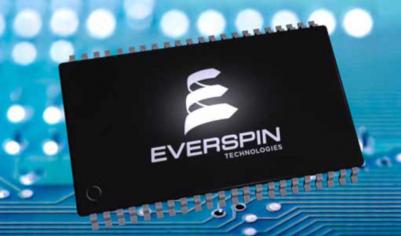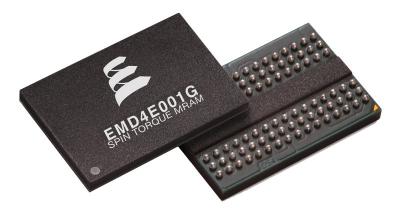Everspin and QuickLogic sign a strategic agreement to bring MRAM technology to radiation hardened FPGAs
In 2022, Everspin Technologies signed a contract to provide MRAM technology, design, and back end of line manufacturing services to QuickLogic Corporation for a project funded by the US Department of Defense.

Today Everspin announced a new strategic contract with QuickLogic. Everspin will provide its innovative AgILYST MRAM technology, logic design, and back end of line manufacturing services to advance the development and demonstration of a Strategic Radiation Hardened (SRH) high-reliability Field Programmable Gate Array (FPGA) technology.
CEA-Leti and NY CREATES to co-develop STT-MRAM and SOT-MRAM devices on 300 mm wafers
The New York Center for Research, Economic Advancement, Technology, Engineering, and Science (NY CREATES) and CEA-Leti announced a two-year strategic R&D partnership, that will initially focus on the research and co-development of MRAM devices.
NY CREATES and CEA-Leti will develop and produce both STT-MRAM and SOT-MRAM devices on 300 mm substrates. CEA-Leti will contribute its expertise in magnetics, spintronics, and the testing of related devices, and NY CREATES will provide the facilities, process integration expertise, and materials process development to run the 300mm silicon hardware.
Alif Semiconductor launch a new AI/ML microcontroller with optional MRAM memory
Alif Semiconductor announced a new microcontroller in its Ensemble family, the E1C, that offers 46 giga-operations per second (GOPS) of minimum-precision compute for on-device machine learning and artificial intelligence workloads.

The Alif E1C offers several memory options, depending on the model, ranging from 256Kb of SRAM in the entry-level option, up to 1.9Mb of MRAM and 2Mb of SRAM in the high-end option.
Reach Your Target Audience with MRAM-Info Advertising
As a business owner or marketer, finding effective ways to reach your target audience is crucial for driving sales and growth. One platform that offers a unique opportunity to connect with a highly engaged and relevant audience is MRAM-Info. MRAM-Info is a leading online resource for information and news related to Magnetoresistive Random-Access Memory (MRAM) technology. This cutting-edge memory technology is rapidly gaining traction in various industries, including consumer electronics, automotive, and aerospace, due to its high-speed, low-power consumption, and non-volatile nature.

By advertising on MRAM-Info, you can tap into a wide audience of professionals, researchers, and enthusiasts who are actively seeking information and solutions related to MRAM technology. Here are some compelling reasons why advertising on MRAM-Info is a smart move:
Targeted Audience
MRAM-Info attracts a highly targeted audience of individuals and organizations interested in MRAM technology. This includes engineers, scientists, researchers, product developers, and decision-makers from various industries. By advertising on MRAM-Info, you can ensure that your message reaches the right people who are actively interested in your products or services.
Samsung on track to start 14 nm eMRAM production by the end of 2024, 8 nm by 2026 and 5 nm by 2027
In 2019, Samsung Electronics announced that it has started to mass produce its first embedded MRAM devices, made using the company's 28 nm FD-SOI process. In 2021, Samsung announced it is working to scale down to 14 nm processes.

The company now says that it has finalized the development of its 14 nm eMRAM process, and will be read to mass produce it by the end of 2024. The company says that the 14 nm process achieve a 33% area scaling compared to its 28 nm process, and it also enables a 2.6x faster read cycle time. Samsung says that its eMRAM enables the smallest size 16MB memory die.
Numem and IC’ALPS co-develop a custom MRAM-powered AI accelerator
High-performance STT-MRAM developer Numem announced that in collaboration with ASIC/SoC designer IC’ALPS it has developed an integrated circuit with RISC-V processors, 2MBytes of NuRAM and a DSP/AI Custom Datapath Accelerator.

The two companies co-developed the SoC in an advanced technology node, taking advance of the high-performance and low power consumption of Numem's memory technology. The company also details that the physical implementation of this integrated circuit was made in a secure space (isolated location, network, and servers, and encrypted exchanges) to meet with the stringent protection of sensitive data required by this program. Numem and IC’Alps intend to extend their partnership to serve new SoC projects for customers.
IBM's next-gen FlashCore modules to feature Everspin's 1 Gbg STT-MRAM
Everspin announced that IBM has chosen the PERSYST EMD4E001G 1Gb STT-MRAM for use in their FlashCore Module 4.

Everspin says that its EMD4E001G high-performance persistent memory ensures critical data integrity even during power loss. With a DDR4 interface, it delivers 2.7 gigabytes/second of both read and write bandwidth, coupled with instant non-volatility.
Everspin reports its financial results for Q1 2024
Everspin Technologies announced its financial results for the first quarter of 2024. Revenues were $14.4 million (down slightly from Q1 2023) and a small loss of $0.2 million (compared to a net income of $0.8 million in Q1 2023).

Everspin reports continued weakness in Asia Pacific, and in the industrial, consumer and automotive markets. However, it is also expecting a ramp up in both design wins and shipments for both toggle MRAM and STT-MRAM in the second half of 2024. In the next quarter, however, it expects revenues to drop significantly to $10 million to $11 million.
Everspin rebrands its persistent memory product family as PERSYST
Everspin Technologies announced that its persistent memory product family is now organized under the new brand name PERSYST. Everspin says that this new initiative to simplify product identification beyond conventional alphanumeric identifiers will make it easier for companies select the right solutions. The company’s legacy toggle MRAM parallel and serial products, 1Gb ST-DDR4 and new EMxxLX xSPI Industrial STT-MRAM will reside under the PERSYST brand.

Everspin says that the PERSYST family of products represents the unique combination of RAM-like speed and latency with non-volatility. With virtually unlimited endurance, PERSYST provides the speed and persistence to capture critical data continuously. It's perfect for use in a variety of industries, such as, automation, robotics, networking, data storage, AI, healthcare, gaming and FPGA.
NETSOL signs Digi-Key MRAM and SRAM distribution agreement
Netsol is pleased to announce a global distribution partnership with Digi-Key Electronics, a pivotal development in its effort to improve global access and delivery of its MRAM and SRAM products.

Digi-Key Electronics is recognized for its immense inventory of electronic parts that are immediately available for shipment. This capability aligns perfectly with the demands of the fast-paced electronics industry, where Digi-Key has distinguished itself by ensuring rapid, efficient delivery services to its global customer base.
Through this newly forged agreement, Digi-Key will leverage its extensive online presence, spanning over 180 countries, to market and distribute Netsol's memory products to customers around the globe.
Pagination
- Page 1
- Next page

